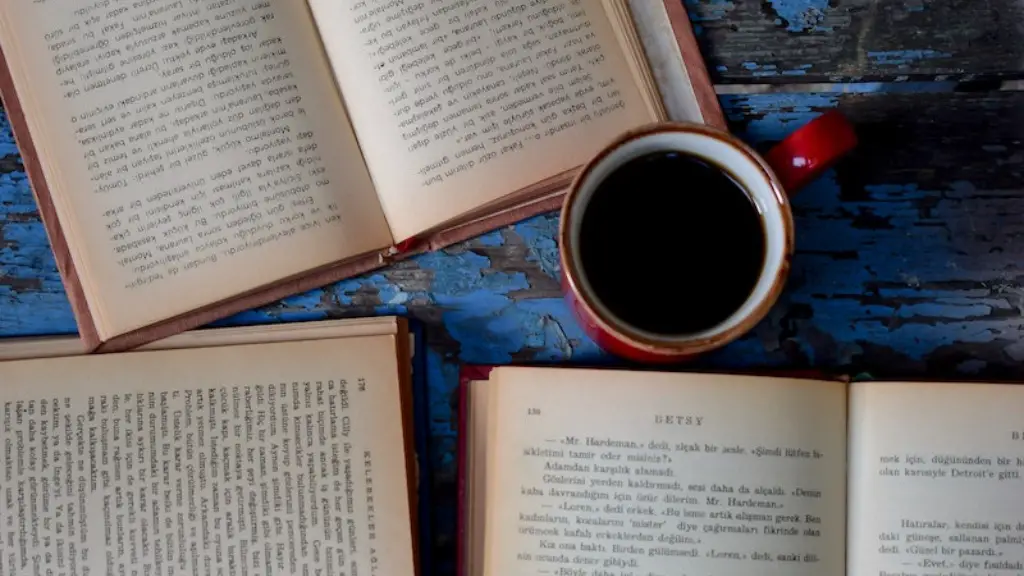Robert Frost was an American poet who wrote several famous poems primarily on the topics of life and nature. His poems are renowned for their strengths in metaphor, imagery and narrative. His poems, While often grounded in personal experience, addressed a wide variety of themes ranging from despair to joy, love to death and longing to acceptance. In particular, Frost is noted for his vivid descriptions of the rural New England life he experienced in the early twentieth century. He often used the natural environment as the setting for his poems, which promoted a sense of peace, beauty and serenity in his readers.
Frost’s poems often tackle the general themes of life and death, as seen in many of his works such as “The Road Not Taken”. This poem, like many of Frost’s works, reflects on the choices we make in life and the consequences of those choices. He often uses the natural world as a metaphor for the decisions we make. Other common aspects of Frost’s work include the idea of being alone in the world, the cycle of life and death, the relationships between man and nature, and the importance of individual questioning and exploration.
Frost’s unique ability to capture the ‘naturalness’ of everyday life makes his poems relevant to this day and age. His works often touch upon the broader themes of life: grief, joy, love, death, and understanding of place. Frost was also deeply concerned with the way in which individuals must negotiate their place in society, both as individuals and collective groups. This is a theme which can be seen in poems such as “Mending Wall”, which reflects on the idea of isolation, as well as “Departmental” which looks at the enforcements of societal conformity.
Frost was also a poet of political thought and change. This can be seen in his poem “Two Tramps in Mud Time”, which speaks to the importance of valuing manual labor and the idea of a class-conscious society. Furthermore, Frost often focused on the effects of war and the need to maintain freedom. He is noted for exploring the American dream in many of his poems. This can be seen in “Stopping by Woods on a Snowy Evening”, a poem which speaks to the isolation of life in the face of responsibility.
The majority of Frost’s poems are written in traditional forms such as rhyme and meter. This is evident in works such as “Stopping by Woods on a Snowy Evening” and “The Road Not Taken”, which feature alternating rhyme. Frost is also known for his use of irony in many of his poems for great effect, as seen in “Mending Wall” and “Design”, which tackle the idea of cosmic justice. His poems reflect his sense of the ironic nature of life, as well as his knack for humor and comedy.
The Personification of Nature in Robert Frost’s Poems
Robert Frost’s poems often contain allegorical elements like personifying nature. He often used this metaphorical device in his writing as a way of expressing his thoughts about nature and human interaction with it. In the poem “Birches”, Frost uses personification of the trees creaking in the wind to symbolise human fatigue or suffering. He also uses it to express a sense of beauty in nature, as he personifies the birch trees which bend and sway in the wind. Personification is also used in “The Road Not Taken” to symbolise the individual’s life choices depicted through the metaphor of an ever-pivoting path. Frost’s use of personification allows him to express a deeper understanding of the humanity’s relationship with nature.
The Power of Nature in Robert Frost’s Poems
Robert Frost wrote extensively on the power of nature and its implications. His poem “Nothing Gold Can Stay” illustrates the transient beauty of spring time and its eventual decay through the use of personification. As the poet notes, nature’s beauty is fleeting, but it is also powerful and can offer a sense of peace and calm to those who choose to embrace it. “The Road Not Taken” is another poem which speaks to the power of nature. In this poem, Frost speaks of the individual’s experience of navigating the various paths of life and the importance of pursuing one’s own path. This can be seen as a metaphor for the individual’s journey through life, and illustrates how Frost saw the power of nature in shaping our life choices.
The Reflection of Self in Robert Frost’s Poems
Robert Frost often wrote about himself in his poems, using it as a way to better understand who he was as a person and what he directly experienced. For example, in the poem “Mending Wall”, Frost uses the metaphor of a wall to symbolise the notion of individual autonomy versus community. Frost uses this poem as a reflection of his experience of loneliness and of the struggles he faced as an individual dealing with the constraints of community expectations. Furthermore, in the poem “Stopping by Woods on a Snowy Evening” Frost uses the natural setting to symbolize his quest for self-discovery. In this poem, Frost highlights his yearning for liberation from the expectations of other people and his exploration of his individual self.
The Intertwinement of Nature and Life in Robert Frost’s Poems
The intertwinement of nature and life is a common theme in Robert Frost’s poems. This theme can be seen in works such as “Home Burial” which speaks to how death brings to light the difficulties between lovers and family members. Frost illustrates this relationship by including imagery of birds, wildflowers, and trees to represent the transient nature of life. Furthermore, in “Birches” Frost uses the imagery of birches bending in the wind to illustrate the cycle of life, death, and renewal. Here Frost is speaking to the idea that life is a series of constantly shifting experiences.
The Use of Metaphor in Robert Frost’s Poems
Robert Frost was a master of the use of metaphor. He effectively used it to convey his thoughts and ideas about life and the universe, often relying on the natural world as a source of metaphor. In the poem “Mending Wall”, Frost uses the metaphor of a wall to illustrate the idea of individual autonomy versus community. Similarly, in the poem “The Road Not Taken” he uses the metaphor of a path to represent the choices we make in life. Additionally, Frost often used the natural world as a metaphor for the passage of time in many of his works such as “Birches” and “After Apple-picking”. Through the use of these metaphors, Frost was able to express the ideas of change and renewal that are inherent to the cycles of nature.
The Use of Allusion in Robert Frost’s Poems
Robert Frost’s poems are often full of allusions to biblical, classical, and literary sources. This is a tactic Frost used to discuss common themes of life, nature and God. In the poem “Design”, Frost alludes to the biblical concept of God’s divine dominion over nature. Similarly, in the poem “After Apple-Picking”, Frost alludes to the Bible’s creation story. In this poem, Frost reflects on his own mortality by alluding to the concepts of the Garden of Eden and its implications for the transient nature of life. Furthermore, in “Fire and Ice” Frost alludes to the Greek myth of Prometheus and his prophesy about the fate of the world. Here Frost uses allusion to illustrate that individual action can ultimately determine the fate of the world.
The Use of Paradox in Robert Frost’s Poems
Robert Frost’s poems frequently use paradox as a literary device. This device allowed Frost to express ideas which might not be easily expressed using traditional language. In the poem “Mending Wall” Frost uses paradox to explore the idea of the wall both holding people together and yet causing separation. Similarly, in the poem “The Road Not Taken” Frost uses paradox to reflect on the decision-making process people are faced with in life. By using the metaphor of a path and its two divergent roads, Frost is able to speak to the idea that often our decisions can split our lives into two radically different directions.
The Introduction of Irony in Robert Frost’s Poems
Robert Frost often uses irony in his poems to illustrate the complex nature of human experience. In the poem “The Road Not Taken”, Frost employs irony to reflect on how humans typically make decisions in life. Frost suggests that individual choices are often misleadingly much more akin to being two paths of equal potential, suggesting that decisions will not always lead to drastically different outcomes. Similarly, in the poem “Mending Wall” Frost uses irony to illustrate the idea of human connection and the resulting limitations imposed by societal constructs. Overall, Frost’s use of irony helped him to create clever and thought-provoking works.



